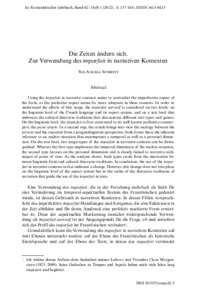Aufsatz

Die Zeiten ändern sich. Zur Verwendung des imparfait in narrativen Kontexten
Zusammenfassung
Using the imparfait in narrative contexts seems to contradict the imperfective aspect of the form, as the perfective aspect seems far more adequate in these contexts. In order to understand the effects of this usage, the imparfait narrative is considered on two levels: on the linguistic level of the French language and its aspect system, and on a text level that embraces the cultural discourse traditions that characterise different text types and genres. On the linguistic level, the imparfait is first contrasted to its well-known perfective counter-part, the passé simple. In a second step, the article brings into view the analogy between the present and the imparfait from a pragmalinguistic perspective: both forms share the inherent reference to an anchor-situation that encompasses a temporal as well as a personal dimension. On the text level, two usage-types of the imparfait in narrative contexts can be distinguished. Whereas the first type emphasises the temporal dimension of the anchor-situation, the second type focuses on the personal dimension and is closely linked to narrative techniques of point of view. As the analysis shows, both types result from the interaction between linguistic form and cultural discourse traditions. In conclusion, the use of the imparfait in narrative contexts in fact indicates a change. However, this change does not take place on the linguistic level of the aspect system but in the realm of the discourse traditions of narration that guide the use of the imparfait in texts.
Zitierform
In: Romanistisches Jahrbuch Band 62 / Heft 1 (2012) , S. 137-164 ; eissn:1613-0413Zitieren
@article{doi:10.17170/kobra-202103083451,
author={Schrott, Angela},
title={Die Zeiten ändern sich. Zur Verwendung des imparfait in narrativen Kontexten},
journal={Romanistisches Jahrbuch},
year={2012}
}
0500 Oax
0501 Text $btxt$2rdacontent
0502 Computermedien $bc$2rdacarrier
1100 2012$n2012
1500 1/ger
2050 ##0##http://hdl.handle.net/123456789/12868
3000 Schrott, Angela
4000 Die Zeiten ändern sich. Zur Verwendung des imparfait in narrativen Kontexten / Schrott, Angela
4030
4060 Online-Ressource
4085 ##0##=u http://nbn-resolving.de/http://hdl.handle.net/123456789/12868=x R
4204 \$dAufsatz
4170
5550 {{Imperfekt}}
5550 {{Narrativität}}
5550 {{Diskurstheorie}}
5550 {{Tempus}}
7136 ##0##http://hdl.handle.net/123456789/12868
<resource xsi:schemaLocation="http://datacite.org/schema/kernel-2.2 http://schema.datacite.org/meta/kernel-2.2/metadata.xsd"> 2021-05-28T12:43:38Z 2021-05-28T12:43:38Z 2012 doi:10.17170/kobra-202103083451 http://hdl.handle.net/123456789/12868 ger Urheberrechtlich geschützt https://rightsstatements.org/page/InC/1.0/ 440 Die Zeiten ändern sich. Zur Verwendung des imparfait in narrativen Kontexten Aufsatz Using the imparfait in narrative contexts seems to contradict the imperfective aspect of the form, as the perfective aspect seems far more adequate in these contexts. In order to understand the effects of this usage, the imparfait narrative is considered on two levels: on the linguistic level of the French language and its aspect system, and on a text level that embraces the cultural discourse traditions that characterise different text types and genres. On the linguistic level, the imparfait is first contrasted to its well-known perfective counter-part, the passé simple. In a second step, the article brings into view the analogy between the present and the imparfait from a pragmalinguistic perspective: both forms share the inherent reference to an anchor-situation that encompasses a temporal as well as a personal dimension. On the text level, two usage-types of the imparfait in narrative contexts can be distinguished. Whereas the first type emphasises the temporal dimension of the anchor-situation, the second type focuses on the personal dimension and is closely linked to narrative techniques of point of view. As the analysis shows, both types result from the interaction between linguistic form and cultural discourse traditions. In conclusion, the use of the imparfait in narrative contexts in fact indicates a change. However, this change does not take place on the linguistic level of the aspect system but in the realm of the discourse traditions of narration that guide the use of the imparfait in texts. open access Schrott, Angela doi:10.1515/roma.62.5 Imperfekt Narrativität Diskurstheorie Tempus publishedVersion eissn:1613-0413 issn:0080-3898 Heft 1 Romanistisches Jahrbuch 137-164 Band 62 false </resource>
Die folgenden Lizenzbestimmungen sind mit dieser Ressource verbunden:
Urheberrechtlich geschützt

